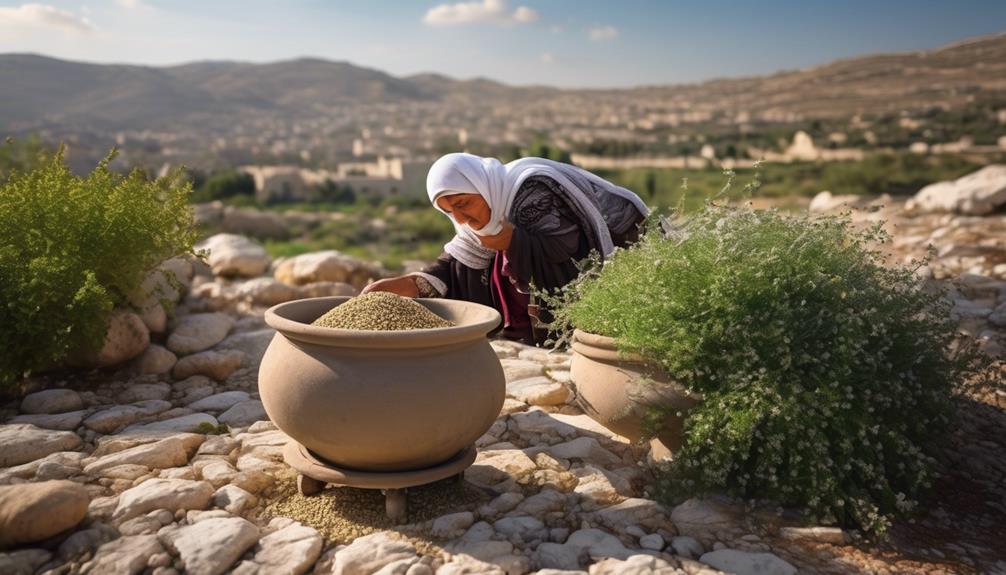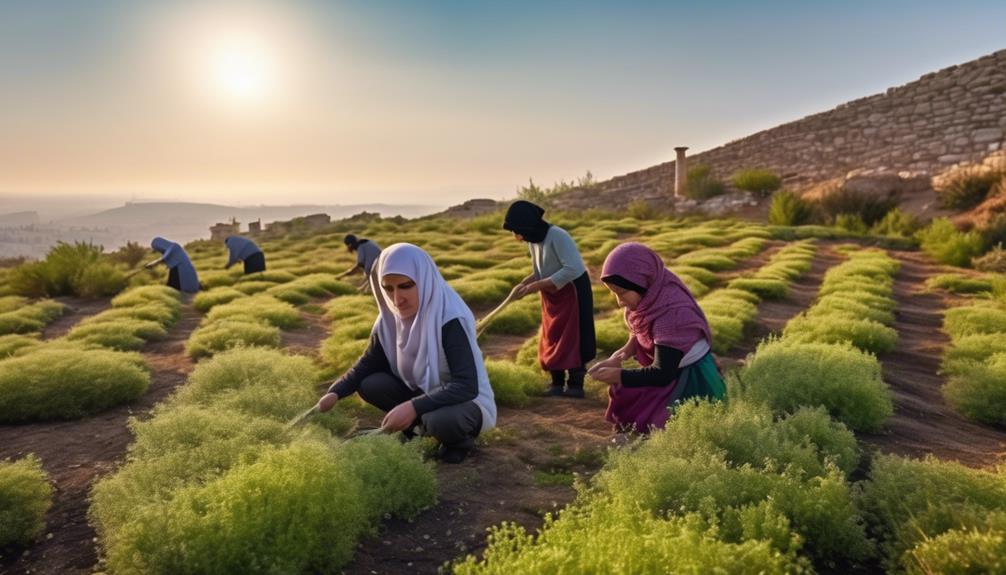As you open the pages of 'The Smell of Za'atar in the Morning: A Palestinian Memory,' you are immediately transported to a world where the aroma of this traditional spice blend holds within it a multitude of stories waiting to be unraveled. The memories intertwined with the scent of Za'atar beckon you to explore a tapestry of flavors, emotions, and experiences that shape the cultural identity of a people. Stay tuned to uncover how a simple herb mixture can carry the weight of generations past and the hopes of generations yet to come.
Origins of Za'atar

The origins of Za'atar can be traced back to the Middle East, where this aromatic herb blend has been a staple in culinary traditions for centuries.
Imagine walking through bustling markets filled with stalls overflowing with vibrant spices and herbs. You come across a stand where the intoxicating aroma of Za'atar beckons you closer. The blend typically consists of dried thyme, oregano, marjoram, sumac, sesame seeds, and salt, creating a unique flavor profile that's both earthy and tangy.
As you watch the merchant skillfully mix the ingredients together, you realize that Za'atar isn't just a seasoning but a cultural symbol deeply rooted in Middle Eastern cuisine.
Over time, different regions have developed their variations of Za'atar, each with its own subtle nuances and ingredient ratios. From Jordan to Lebanon, Syria to Palestine, Za'atar holds a special place in the hearts of those who grew up savoring its distinctive taste.
Whether sprinkled on flatbreads, mixed with olive oil for dipping, or used to season meats, Za'atar continues to captivate taste buds around the world with its rich history and bold flavors.
Cultural Significance
Immerse yourself in the rich tapestry of traditions intertwined with the aromatic allure of Za'atar. In Palestinian culture, Za'atar holds a profound significance that goes beyond its culinary uses. It's a symbol of heritage, passed down through generations, carrying with it the stories and memories of the land.
Za'atar isn't just a spice; it's a connection to the past, a link to Palestinian identity and resilience. The act of harvesting and preparing Za'atar is a communal activity, bringing families and communities together. The sharing of Za'atar recipes is a way of preserving cultural knowledge and honoring ancestors.
During special occasions and gatherings, the scent of freshly baked bread sprinkled with Za'atar fills the air, evoking a sense of nostalgia and belonging. It's a flavor that resonates deeply with Palestinians, reminding them of home, family, and tradition.
In Palestinian folklore, Za'atar is believed to bring good luck and protection. Its presence in homes is thought to ward off evil spirits and bring blessings to those who partake in its savory goodness. The cultural significance of Za'atar isn't just in its taste but in the stories, rituals, and memories that surround it, making it a cherished emblem of Palestinian heritage.
Harvesting and Preparation

Engage in the age-old tradition of harvesting and preparing Za'atar, a practice deeply ingrained in Palestinian culture. To start, gather wild thyme leaves, sesame seeds, sumac, and salt. Here is a simple guide to help you get started:
| Ingredients | Quantities Needed |
|---|---|
| Wild Thyme Leaves | 2 cups |
| Sesame Seeds | 1/4 cup |
| Sumac | 2 tbsp |
| Salt | 1 tbsp |
First, collect the wild thyme early in the morning when the oils are most potent. Dry the leaves thoroughly before removing them from the stems. Then, toast the sesame seeds until they release their nutty aroma. Combine all the ingredients and grind them coarsely using a mortar and pestle or a food processor. Adjust the salt to your liking. Your Za'atar is now ready to be enjoyed with olive oil and fresh bread, transporting you to the heart of Palestinian culinary heritage.
Memories of Breakfast Rituals
Start your day with a nostalgic journey through memories of breakfast rituals intertwined with the aroma of freshly made Za'atar.
- Waking up to the sound of sizzling olive oil in the pan, ready to fry eggs sprinkled with Za'atar.
- Watching the steam rise from a piping hot bowl of creamy hummus topped with a generous drizzle of olive oil and a sprinkle of Za'atar.
- Breaking off a piece of warm, freshly baked bread, still soft from the oven, and dipping it into a mixture of olive oil and Za'atar.
- Sitting around the table with loved ones, sharing stories and laughter over a traditional Palestinian breakfast spread featuring Za'atar in various dishes.
These memories of breakfast rituals evoke a sense of warmth and togetherness, each bite infused with the rich flavors of olive oil and the earthy tang of Za'atar.
As you reminisce about these moments, you can almost taste the nostalgia lingering in the air, reminding you of the simple joys found in the daily rituals of sharing a meal with family.
Za'atar in Palestinian Cuisine

Exploring the culinary landscape of Palestinian cuisine reveals the prominent role of Za'atar in a myriad of traditional dishes. This aromatic herb blend, consisting of dried thyme, sumac, sesame seeds, and salt, holds a special place in Palestinian cooking. From mana'eesh, a popular flatbread topped with Za'atar, to grilled meats marinated in a Za'atar-infused olive oil, this versatile spice mix adds a distinctive flavor to various dishes.
In Palestinian households, Za'atar isn't just a seasoning but a symbol of cultural heritage and culinary tradition. It's often mixed with olive oil and spread on bread or used as a dip for vegetables, creating a flavorful and fragrant experience.
The earthy, tangy, and slightly nutty taste of Za'atar is deeply ingrained in Palestinian cuisine, reflecting the rich history and agricultural abundance of the region.
Whether sprinkled over salads, stirred into yogurt, or incorporated into meat and vegetable dishes, Za'atar brings a unique depth of flavor that's quintessentially Palestinian. Its presence in the kitchen signifies a connection to the land, a celebration of local ingredients, and a nod to generations of culinary expertise passed down through time.
Symbolism in Family Traditions
Incorporate family traditions rich in symbolism to deepen the connection to your cultural heritage and culinary roots. Family traditions hold a significant place in Palestinian culture, serving as a way to pass down stories, values, and customs from one generation to the next.
Through these traditions, you can truly feel connected to your roots and embrace the essence of your heritage. Here are some symbolic elements commonly found in Palestinian family traditions:
- Olive Branch: Symbolizing peace and prosperity, the olive branch is often used in Palestinian family gatherings as a reminder of resilience and hope.
- Henna Ceremony: The henna ceremony, a pre-wedding tradition, symbolizes joy, beauty, and good luck for the future of the couple.
- Bread Baking: The act of baking bread together as a family symbolizes unity, sharing, and the importance of sustenance in Palestinian culture.
- Embroidery Patterns: Traditional Palestinian embroidery patterns carry deep symbolism, representing themes such as love, fertility, and protection within the family.
Za'atar as a Connection to Home

Connect to your Palestinian roots through the aromatic essence of za'atar, a staple herb in Middle Eastern cuisine that evokes memories of home and tradition. The scent of za'atar can transport you back to bustling kitchens filled with laughter, where generations of your family gathered to share meals and stories. Sprinkling za'atar on fresh bread drizzled with olive oil can instantly reconnect you to the flavors of your childhood, reminding you of lazy afternoons spent under the warmth of the sun.
Za'atar isn't just a herb; it's a symbol of resilience and continuity. As you savor its tangy, earthy taste, you're reminded of the strength and perseverance that runs through your veins, inherited from ancestors who passed down their traditions through the simple act of seasoning their food with this aromatic blend.
Each bite infused with za'atar becomes a link to your past, a way to stay grounded in your heritage no matter where life may take you. Embrace the comfort and familiarity that za'atar brings, allowing it to be your guide back to the heart of your Palestinian identity.
Historical Roots of Za'atar
Explore the ancient origins of za'atar, uncovering its culinary and medicinal significance in the Middle East. Za'atar, a versatile herb blend, has a rich history dating back centuries, with roots deeply embedded in the region's culture and traditions.
Culinary Uses: Za'atar has been a staple in Middle Eastern cuisine for generations, adding a unique flavor to dishes like mana'eesh and salads.
Medicinal Properties: Historically, za'atar has been used for its various health benefits, believed to aid digestion, boost the immune system, and improve cognitive function.
Symbol of Heritage: Za'atar holds symbolic importance in many Middle Eastern communities, representing a connection to the land and a sense of identity.
Trade and Exchange: The trade of za'atar has played a significant role in the cultural exchange between different regions, influencing culinary practices and traditions.
The historical roots of za'atar reveal not only its culinary versatility but also its deep-seated significance in the cultural fabric of the Middle East.
Za'atar's Role in Identity

Za'atar serves as a cultural emblem, embodying a deep sense of heritage and belonging in Middle Eastern communities. For you, its aroma triggers memories of family gatherings, shared meals, and a connection to your roots. The unique blend of thyme, sumac, sesame seeds, and salt not only tantalizes your taste buds but also carries with it a legacy passed down through generations.
Incorporating za'atar into your dishes is more than just a culinary choice; it's a way to honor your ancestors and preserve traditions. Whether sprinkled on bread with olive oil or mixed into yogurt, each bite reaffirms your identity and links you to a rich cultural tapestry. The distinct flavor profile of za'atar distinguishes your cuisine, setting it apart and showcasing the depth of your heritage.
Through za'atar, you carry forward a piece of your history, a tangible reminder of who you're and where you come from. It's not just a spice; it's a symbol of resilience, community, and the enduring spirit of your people.
Preserving Palestinian Heritage
Amidst ongoing challenges, preserving Palestinian heritage remains essential for maintaining cultural legacy and resilience. It's important to safeguard the rich tapestry of traditions, stories, and practices that have been passed down through generations.
By actively engaging in the preservation of Palestinian heritage, you contribute to the resilience of your community and guarantee that future generations can connect with their roots.
Here are some key ways you can help in this important endeavor:
- Documenting Oral Histories: Recording the stories, experiences, and wisdom shared by elders helps preserve valuable knowledge for the future.
- Supporting Artisans: By purchasing and promoting traditional crafts and products, you help sustain local artisans and traditional practices.
- Celebrating Festivals and Traditions: Participating in cultural events and traditional celebrations keeps customs alive and fosters a sense of community.
- Educating Others: Sharing your knowledge of Palestinian heritage with friends, family, and the broader community raises awareness and appreciation for these important cultural aspects.
Conclusion
As you take in the aroma of Za'atar, you're transported to a world of tradition, family, and resilience. Through this simple blend of herbs and spices, you connect with your Palestinian roots and the memories that define you.
The smell of Za'atar in the morning isn't just a scent, but a reminder of the rich cultural heritage and enduring spirit of your people. Embrace the essence of Za'atar and cherish the memories it brings.